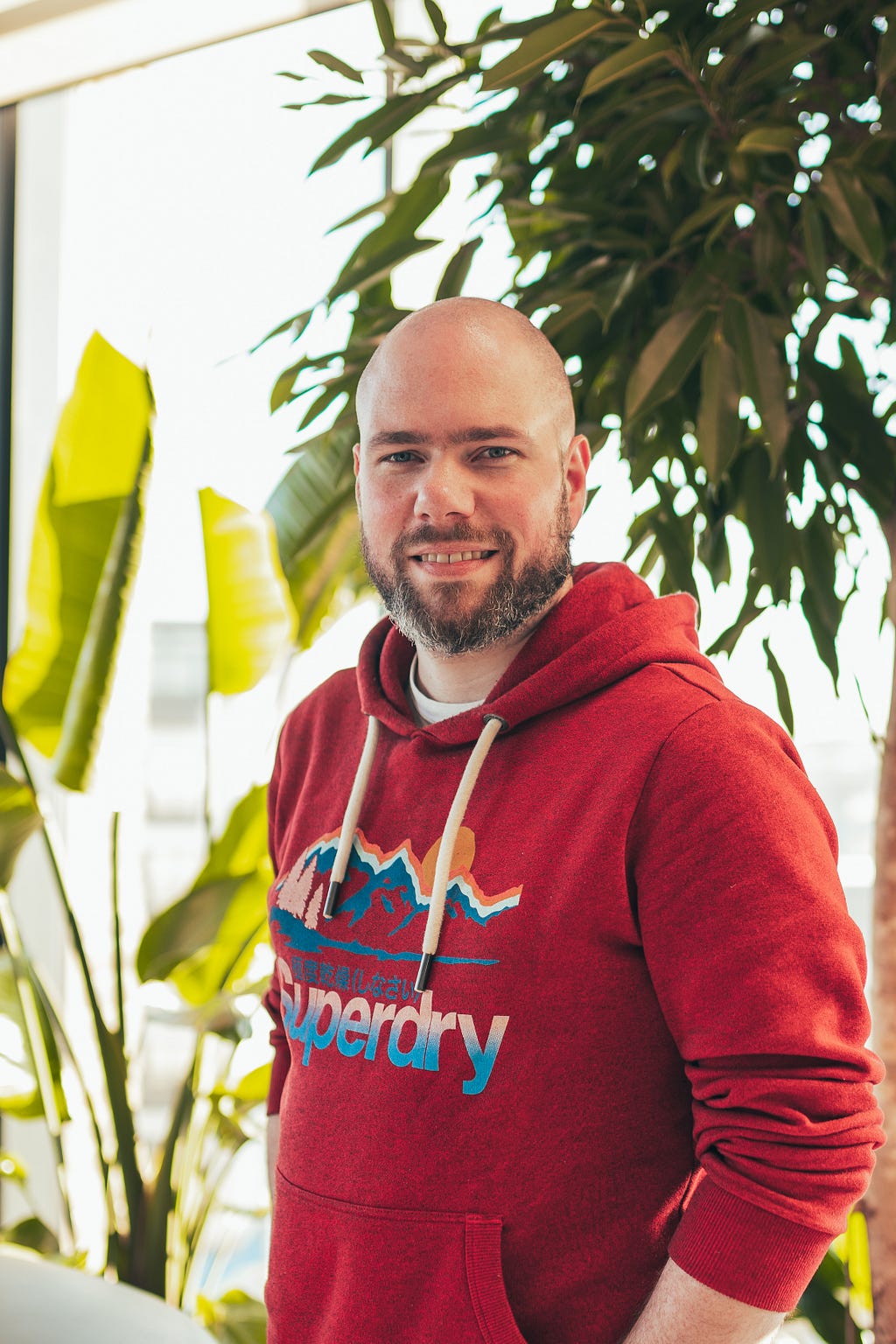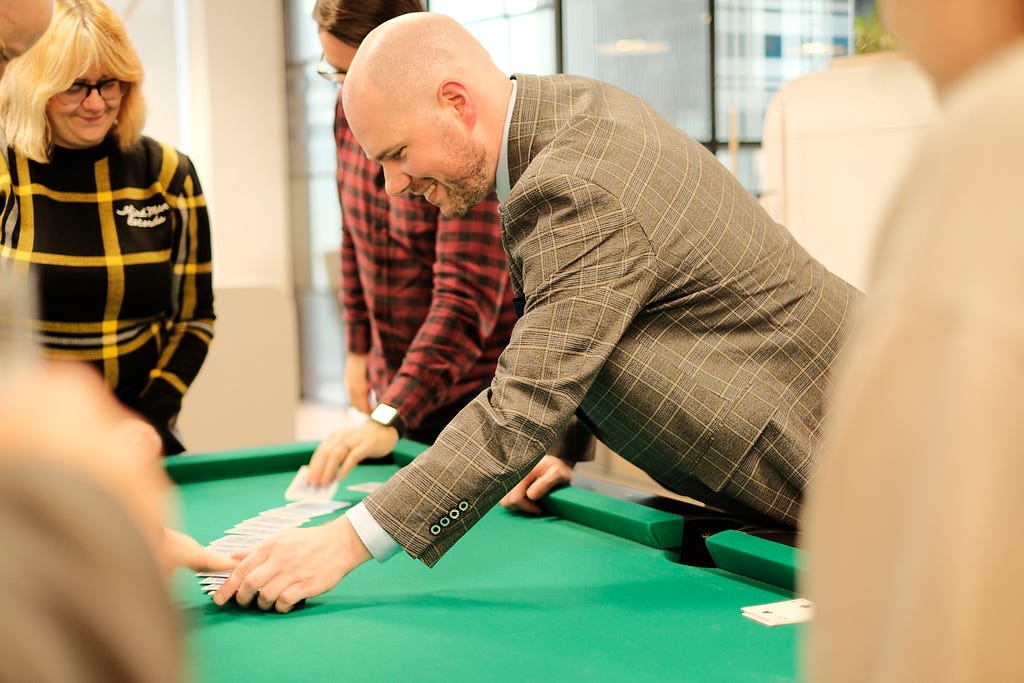Meet Jack: Principal Software Engineer by day, Magician by night

In the realm of technology, where innovation and intricate problem-solving collide, is Jack Talbot, a Principal Software Engineer at FanDuel who is not only a lead within the complex domain of Core Products and Experiences but also wields a different skill — the world of close-up magic.
Jack performed a close-up magic show to our FanDuel Edinburgh colleagues during the Edinburgh Fringe Festival, one of the world’s largest comedy, arts and culture festivals and we sat down with him to discuss his journey and how the two worlds intertwine.
Can you introduce yourself, your role and what are you responsible for at FanDuel?
I’m a Principal Software Engineer within the Core Products and Experiences (CPE) domain with a focus on that domain in general but also more specifically the software architecture within payments. Within my role I’m exposed to many of the different domains within FanDuel and am involved in setting the tech strategy, as well as working to communicate that across the company through making that information accessible.
I’m also the guy that performs tricks at pretty much every social event at FanDuel. because I moonlight as Magician specializing in Close-up Magic with a focus on cards and coins.
What is close-up magic and how did your journey into it begin?
Close-up magic is specifically focused on creating an illusion with small objects, performed in an intimate setting. Really, I’m a storyteller with magic being the visual punctuation, and I’ve been performing for 16 years now.
My interest in magic started when I was a lonely nerd in my bedroom as a kid. I was blown away watching a Paul Daniels performance, so I bought his box of magic tricks and made a start of figuring it out. I have Aspergers Syndrome and part of that means I physically stim and fiddle a lot, so when I started picking up cards and fiddling with them this fulfilled that physical need and eventually transformed into an art form as I mastered card manipulation, turning it into a tool for both satisfying my sensory needs and entertaining people.
The Power of Performance and Communication
What is your favourite part of performing magic?
For me, it’s the art of storytelling. I learnt very early in my career from a manager at my first software job, the best way to get others to listen to a presentation is first to ask the question everyone wants to know the answer to, then before you give away the answer, tell everyone you’re going to tell a story. People love listening to and telling stories.
By incorporating storytelling into my performances, the entire experience becomes more than just tricks; it transforms into an engaging narrative. Magic serves as the punctuation, like an exclamation mark or a full stop, woven into the story’s fabric. In this way, magic isn’t the sole focus; it becomes a prop that supports the overarching narrative. This approach enables me to connect with people on a deeper level, leveraging magic as a vessel that elevates communication to a new level.

The Magic in Technology Leadership
Do you feel magic has impacted your professional career?
Yes, absolutely. Performing magic has been very useful in my day-to-day job as it has helped enable ways of communicating within both an emotional and technical level. It has allowed me to develop those skills to an audience, keeping them engaged and talking in a way that allows people to be bought into the vision. I’m able to talk in multiple different languages. A deep technical language with technologists, but also higher-level information language for stakeholders so they can understand the journey and detail that is underpinning that.
Not only has it helped me with communication skills, but it also underpins a belief system within myself too. Magic challenges perceptions of what’s possible. When you see magic, you see the impossible. That can translate into, ‘What is it in your life that you think is impossible, that if you look in a different way it could be easy?’
Magic is the artform that can show you and prove that the impossible is possible, it’s just about perspective.
Bridging the Gap: Magic and Software Engineering
What similarities do you feel Magic and Software Engineering have?
My favorite part of my day-to-day job is solving problems with seriously clever people. Working at FanDuel I love being surrounded by ridiculously intelligent people and I am surrounded by them on a daily basis, solving problems. I also enjoy creating opportunities for others to get involved in as they develop their careers . I get to watch people realize they can solve challenges and support other engineers in their career path.
Magic is solving the problem of something being impossible. When I design my tricks, I come up with what I want the audience to see, then I work out how to make that happen. What that has done with my problem-solving capabilities in Software Engineering means if I can solve problems in magic, I can definitely solve problems in engineering, because if I can make the impossible happen, software must be simple. The challenge of solving a problem exists in both worlds and it’s something I love doing.
The Edinburgh Festival Fringe is one of the greatest celebrations of arts and culture on the planet and takes place every August for the full month in Edinburgh, Scotland’s capital city and dates back to 1947.
You can watch Jack’s performance in 2024 at a stage in Edinburgh during the festival.
Meet Jack: Principal Software Engineer by day, Magician by night was originally published in FanDuel Life on Medium, where people are continuing the conversation by highlighting and responding to this story.